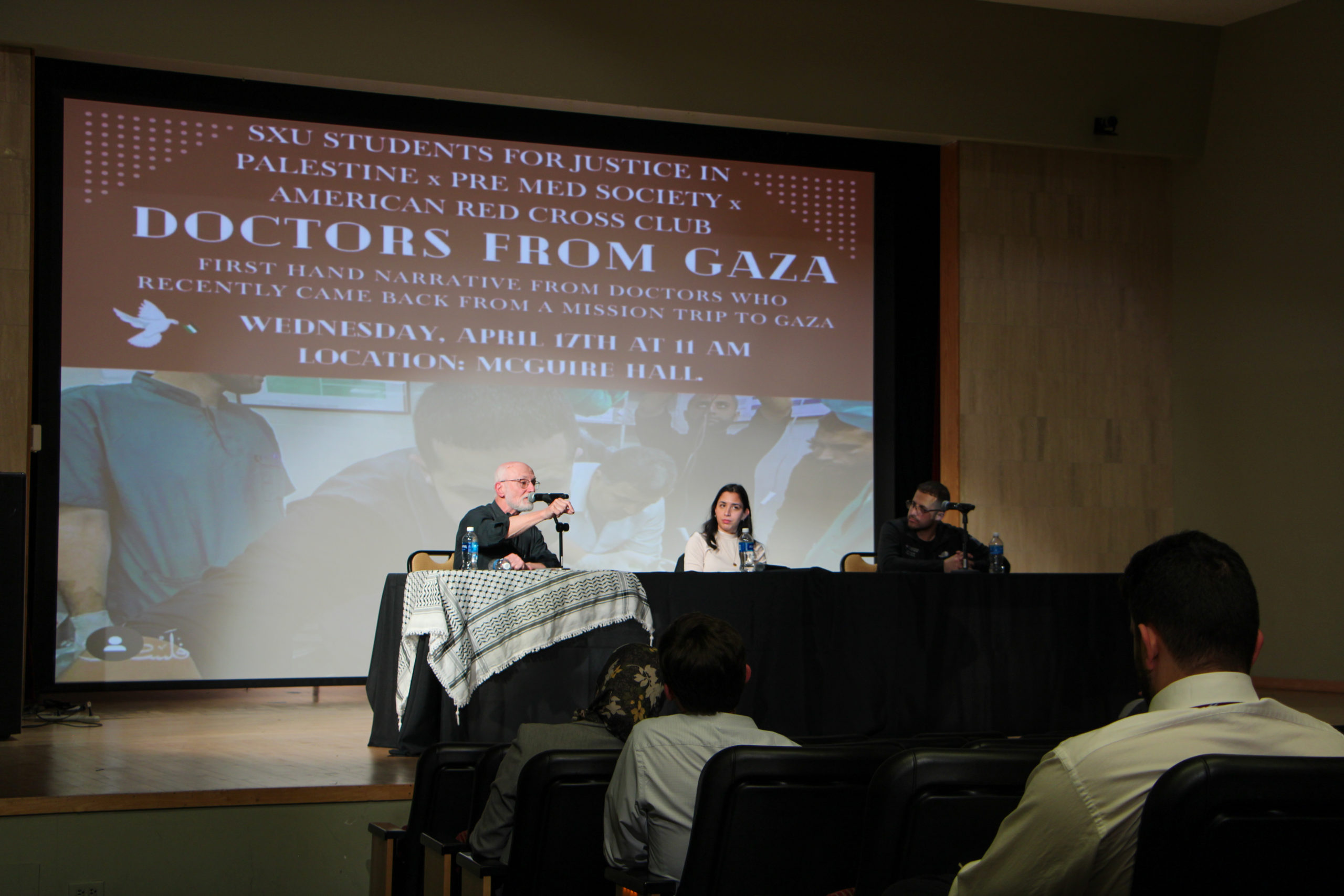Panel discussion Javell Sheppard
Students for Justice in Palestine (SJP), the American Red Cross Club, and the Pre-Medical Society hosted three doctors who shared their firsthand accounts of working in Gaza’s healthcare system on April 17, 2024.
Thaer Ahmad, M.D., Tammy Abughnaim, M.D., and John Kahler, M.D., have each spent time on missions working as healthcare providers in Gaza.
“Any and every doctor who puts their life on the line to go help out in Gaza, is a hero of humanity that we would be honored to host,” stated Jena Kanaan, President of SJP.
The panel discussion was led by Kanaan, who asked the doctors about their experiences.
One question centered around the current medical supply shortage in Gaza. Clinics such as MedGlobal’s, located in Rafah, see 600-700 patients a day according to Kahler.
The Central Drug Store that supplies all of the area’s hospitals operated with only 55% of the “essential medicines that the World Health Organization says you need to have” before Oct. 7, voiced Ahmad.
Since Oct. 7, the blockade imposed on Gaza has become more restrictive. Ahmad stated that aid trucks get inspected up to six times and can be rejected for items that were previously allowed through the blockade.
Medical resources are not the only thing being impacted in Gaza; Abughnaim noted that brain power has also taken a hit.
Abughnaim expressed that “health care workers are quite exhausted and they’re mentally, physically drained, not just by the work itself, but by the trauma of having to survive something like this over and over and over again, and then know that they could be the next victims.”
Kanaan then asked how the doctors kept their spirits up while working in Gaza.
Abughnaim responded that it was difficult to hone in on the happy memories, but she could think of a young boy who brought her joy.
After being displaced from North Gaza, the ten-year-old boy started hanging around ambulance crews and persuaded them to bring him with them to locations of airstrikes. He then began helping in the same emergency department as Abughnaim, by grabbing stretchers and even learning how to insert an I.V. line.
His creative solution to the supply shortage of sugar, boiling tea leaves in D5W (dextrose five percent in water) to create a “sweetened” tea, was one specific memory that Abughnaim could reflect on.
“You start to really miss these things and crave these things and want some kind of sense of normalcy in the way that he was able to introduce it with this crazy creative idea. This was just astounding to me. And, you know, it really does speak to not only the resilience, but the creativity and the capability of, you know, the children as the people outside,” she elaborated.
Kanaan also questioned what the doctors learned while in Gaza, to which Ahmad answered that he feels a sense of responsibility to “bear witness for what we saw, to share that information, to advocate.”
“I think it’s important for us to reach people who also may not be fully aware of this and help inform them. And educate them about what’s taking place,” continued Ahmad.
Abughnaim emphasized that “you cannot change people on either end of the spectrum.”
An attendee of the panel asked the doctors how their higher profile due to their media coverage impacted their safety.
Ahmad shared that “you come to the reality that, you want to somehow, if something happens, you want it to bring attention to the situation.”
Kanaan concluded the panel questions by urging attendees to use their voices and to continue to educate others, as she explained that the panel was hosted to “to keep the conversation about Palestine going.”
Kahler then rounded out the panel, stating that “this is the moment. Now. This is something you will tell your children. This is an inflection point.”
MedGlobal, among many other organizations, has missions going to Gaza. Volunteer forms can be found on their website, medglobal.org.

